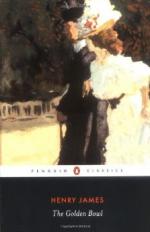had never made his daughter, and Charlotte must at
least have had for her that, thanks to her admirable
instinct, her range of perception marching with his
own and never falling behind, she had probably not
so much as once treated him to a rasping mistake or
a revealing stupidity. Maggie, wonderfully, in
the summer days, felt it forced upon her that that
was one way, after all, of being a genial wife; and
it was never so much forced upon her as at these odd
moments of her encountering the sposi, as Amerigo
called them, under the coved ceilings of Fawns while,
so together, yet at the same time so separate, they
were making their daily round. Charlotte hung
behind, with emphasised attention; she stopped when
her husband stopped, but at the distance of a case
or two, or of whatever other succession of objects;
and the likeness of their connection would not have
been wrongly figured if he had been thought of as
holding in one of his pocketed hands the end of a
long silken halter looped round her beautiful neck.
He didn’t twitch it, yet it was there; he didn’t
drag her, but she came; and those indications that
I have described the Princess as finding extraordinary
in him were two or three mute facial intimations which
his wife’s presence didn’t prevent his
addressing his daughter—nor prevent his
daughter, as she passed, it was doubtless to be added,
from flushing a little at the receipt of. They
amounted perhaps only to a wordless, wordless smile,
but the smile was the soft shake of the twisted silken
rope, and Maggie’s translation of it, held in
her breast till she got well away, came out only,
as if it might have been overheard, when some door
was closed behind her. “Yes, you see—I
lead her now by the neck, I lead her to her doom, and
she doesn’t so much as know what it is, though
she has a fear in her heart which, if you had the
chances to apply your ear there that I, as a husband,
have, you would hear thump and thump and thump.
She thinks it
may be, her doom, the awful place
over there—awful for
her; but she’s
afraid to ask, don’t you see? just as she’s
afraid of not asking; just as she’s afraid of
so many other things that she sees multiplied round
her now as portents and betrayals. She’ll
know, however—when she does know.”
Charlotte’s one opportunity, meanwhile, for
the air of confidence she had formerly worn so well
and that agreed so with her firm and charming type,
was the presence of visitors, never, as the season
advanced, wholly intermitted—rather, in
fact, so constant, with all the people who turned
up for luncheon and for tea and to see the house,
now replete, now famous, that Maggie grew to think
again of this large element of “company”
as of a kind of renewed water-supply for the tank
in which, like a party of panting gold-fish, they
kept afloat. It helped them, unmistakably, with
each other, weakening the emphasis of so many of the
silences of which their intimate intercourse would
otherwise have consisted. Beautiful and wonderful




